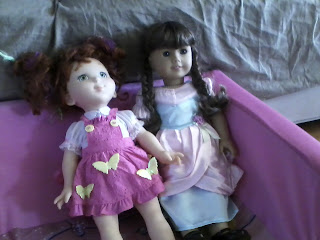(Catchy title, don’t you think?)
I came home from work the other day to be greeted by my
daughter asking to play with her and her American Girl doll, Molly.
“Ok, Molly’s the baby, and you can be her Mommy.”
“Wait a minute, why can’t I be her Daddy? I’m better at being Daddy.”
My daughter threw up her arms in frustration and said,
“Dad! What difference does it make?”
A good point. What difference DOES it make?
Which got me thinking about socialized gender roles.
As we all know, girls like princesses and ponies, boys like
pirates and trains, moms take care of babies, dads go to work, usually in
suits.
This is, right off the bat, complete nonsense.
So where did that come from?
There is a general sense that girls are just made one way
and boys another. But in fact, gender
roles are created and passed on by society, and they have absolutely nothing to do with
the chromosomal sex of the person. We
created them over time, passed on perceptions of gender differences, most of
which were originally based on cultural or logical fallacies, and have evolved
through the decades, even centuries, often in direct opposition to the
evolution of mainstream social thought around adult gender roles.
In other words, we still tell young girls they can’t play
with dinosaurs, they have to play with dolls, maybe not in so many words, but the message is there. But we also tell them they can be
anything they want to be when they grow up.
Why can’t they be anything they want to be right now?!
 | |
| Future Doll President of the Doll United States, Molly, with Secretary of State Fancy Nancy. |
And how often do we still tell ourselves, “But boys are
different from girls”?
Well, yes, obviously, but boys are also different from other
boys, and girls different from other girls, and most of the differences between
them are borne not from biological differences, but from the differences we
insert, most often sub-consciously, into their being.
Are boys different from girls? Less than you think. And even taking into account the few
biological differences that do exist, including differences in basic chemistry
(hormones, for instance), in very
young children, those differences are
virtually non-existent.
But the stereotypes live on.
And we play directly into them in every decision we make as parents,
right down to the color baby blanket they are wrapped into as infants.
And as parents, my wife and I have tried very hard to shield
our daughter from these stereotypes. I
think, to some degree, we’ve succeeded.
Here is a list, in no particular order, of things my daughter loves:
Princesses (especially Disney)
Rainbows
Trains
Dinosaurs
Legos
We’ve done a good job.
But as soon as she started school, I started hearing things like,
“Pirates are for boys, princesses are for girls.” The social stereotypes seeped into her life
at the very moment she started making new friends, and the way the children interact with each other serves as a kind of stereotyping filter, helping to form the stereotypes in each child's mind. Even now, when she tells me about her invisible ninja friends, the girl ninjas are much nicer than the boy ninjas.
Gender stereotypes
permeate our society; they cannot be avoided, and, truth be told, they do serve
a purpose in encouraging children to understand the biological differences
between boys and girls without adults having to actually explain those
differences, or the biological purpose of those differences (ahem). Long before needing to learn the birds and the bees, they learn the difference between girl ninjas and boy ninjas.
So, to go back to my daughter’s original point, what
difference does it make?
In that case, I guess, none, and that’s kind of the
point. To her, it didn’t matter if I was
the Mommy, or if I was the Daddy, because both Mommy and Daddy can care for
Molly. Two points for Team Parenting.
But it DOES make a difference if we ever forget that these
gender roles are just what the name implies: roles that we play.
If she had said no, I needed to be Mommy, because Mommys
look after Mollys, that would have been a expression of a stereotypical gender
role, which says women have the maternal instinct, or what I've lately heard called “Mommy
Intuition,” necessary to care for children.
That’s a role, no different from an actor reciting his lines. We can play those roles, but in addition, like a good
understudy, we can also learn other roles.
The only damage from playing one of these gender roles comes when we put forward those roles, those
pre-determined arbitrary bits of dialogue, as reality in and of themselves.
We are not the gender roles that society wants us to play,
and we can all learn a great deal by looking beyond those roles, by learning
some of lines from our fellow actors.
As Shakespeare said, “All the world’s a stage, and all the
men and women merely players: they have their exits and their entrances; and
one man in his time plays many parts.”
Yeah, that’s right I just ended this blog with a quote from
Shakespeare.
Take THAT, ninth grade English teacher!


